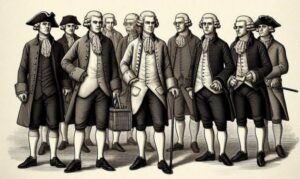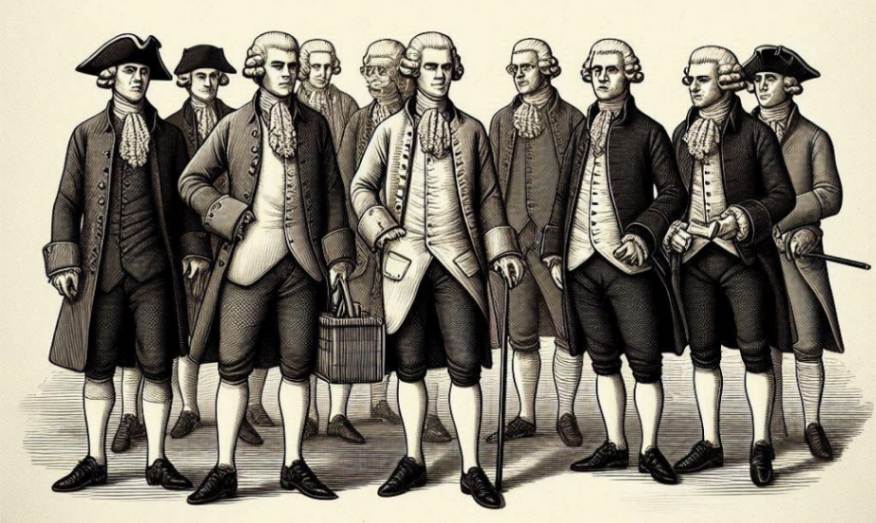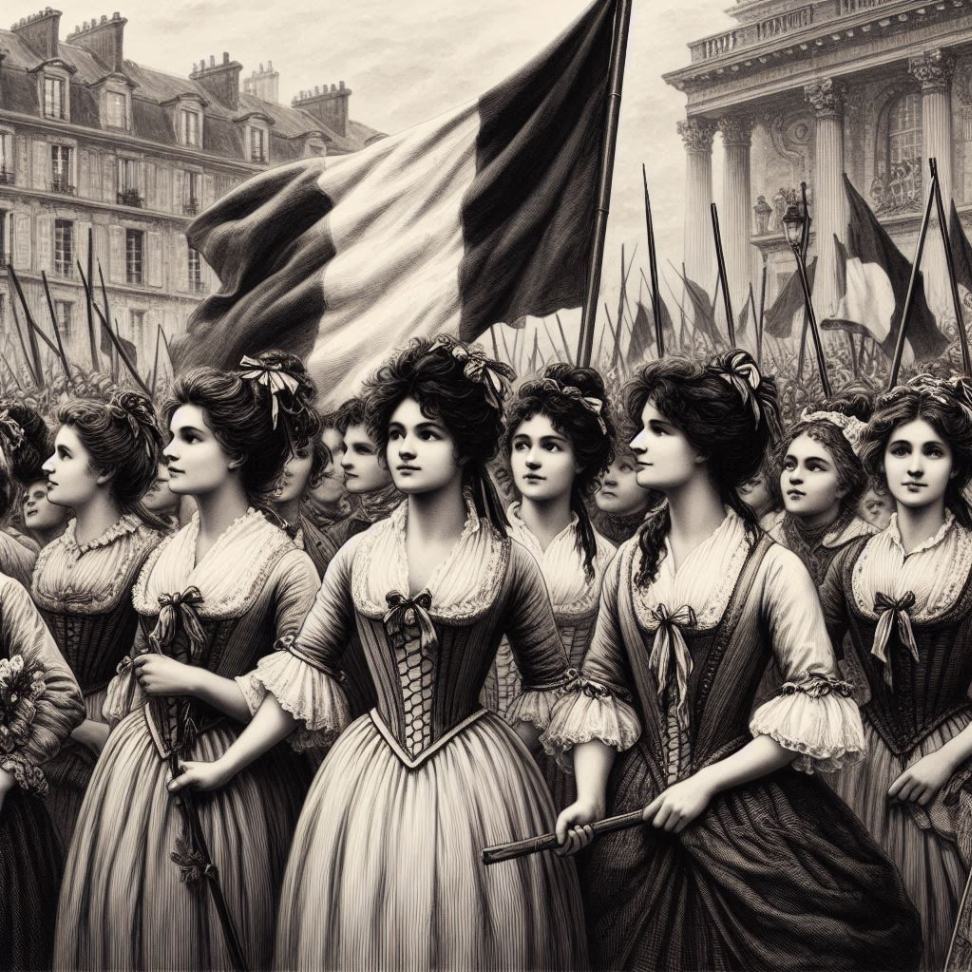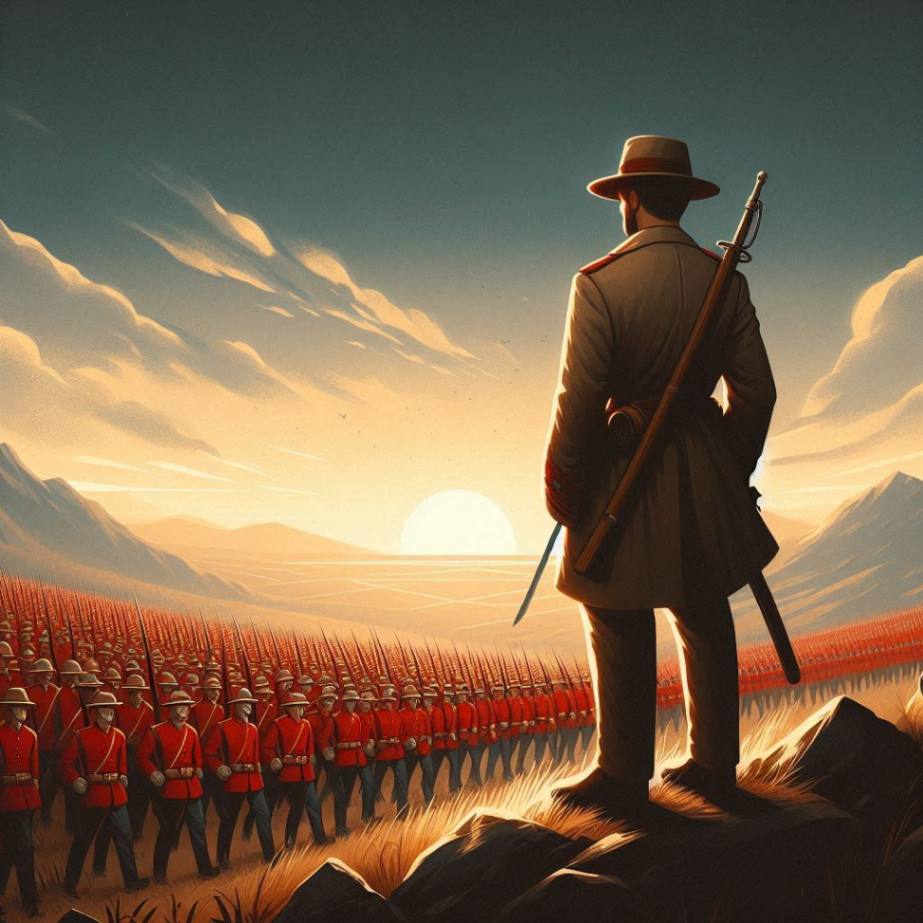Chapter-1 Part-4
Introduction
In Part-3 of Chapter 1, we learned about France’s social and economic conditions before the French Revolution “The Struggle to Survive: Survival Challenges Before the French Revolution. In Part -4 of Chapter 1, Let’s study Middle-Class Emergence and explore the ideas of philosophers who shaped this period.
Middle-Class Emergence
- In the 1700s, a new group called the middle class began to emerge within the third estate.
- This class consists of:
- Merchants and manufacturers who produced wool and silk clothes.
- Traders purchased these clothes from the manufacturers and traded with other countries. They also sold wool and silk clothes to wealthy individuals within their own country.
- Lawyers and administrative officials, who served as officers working in government offices.
- This Middle-Class Emergence played a significant role in challenging the old privileges based on birth.

Beliefs and Values of the Middle Class
- Educated members of the middle class believed that no group in society should enjoy privileges based on birth.
- They thought:
- No one should be judged by their Family status(Birth Privilege).
- Instead, we should judge an individual based on knowledge and hard work.
Birth Privilege means
- A person receives special benefits or treatment just because of the family they were born into.
- They receive wealth, power, or social status as a birth Privilege from their family.
- Wealth, power, or social status are not achieved by their hard work. They just obtained it just because of their family background.
Influential Philosophers and Their Ideas
John Locke (16th Century French Philosopher)
- According to him,
- everyone on earth is born with rights such as the right to life, liberty (freedom), and property (things they own).
- The government must protect these rights. If the government failed to protect these rights, the people had the right to change the government.
- In his book “Two Treatises of Government”,
- He denied the idea that kings are chosen by God to have total control over everything.
- Instead of the king and queen making all the decisions, Locke argued that the people have the right to choose their leaders and help decide how their country should be run.
Jean Jacques Rousseau (17th Century French Philosopher)
- He believed in his ideas of Social contract
- Social Contract Refers to an agreement among the people of the society to live together as a society and agree to follow certain rules to keep everything organized and safe.
- If citizens of a country follow the rules made by the Government, then the Government promises its citizens to protect the people and provide other benefits, like services and support
- According to Rousseau, the government should do what most people in the society want, wish, or desire.
- He wrote about his idea ” in his book “What will happen if Society and government work together” which is known as a “Social Contract”.
- He believed that every person should be able to share their opinions on how the government should operate.
- The government should not show partiality to the rich and poor in society. They must make decisions which should be applied to all.
Views of French philosophers: A Society where everyone is treated equally and everyone has the same opportunities in life
- French philosophers John Locke and Jean Jacques Rousseau imagined a society where
- Every citizen of a country agrees to follow the same rules, provide equal opportunity to succeed in life and obtain equal respect, regardless of their background.
- Rich and poor must be judged based on the rules that apply to everyone, and both must receive the same punishments regardless of their social status.
- Everyone in society can do whatever they want, as long as it doesn’t hurt others.
Montesquieu’s Separation of Powers (18th Century French Philosopher)
- In his book “The Spirit of the Laws,” Montesquieu suggested the idea of separating the powers of government into three branches.
- Legislative Branch
- Executive Branch
- Judicial Branch
Legislative Branch(Rule Makers)
- It refers to the part of the government that creates new laws that everyone in the country has to follow.
- Citizens of a country elect Members of the legislative branch.
- Members of the legislative branch are called Members of Parliament(MPs)
- MPs come together in a place called a legislature (like a parliament building) and discuss whether a new law is needed or how it might affect people.
- MPs will examine the new law made together and then vote to approve or reject it.
- This decision is based on what they think is best for the country and the people who voted for them to become MPs.
Executive Branch(A group that makes sure everyone follows)
- They ensure that everyone in the country follows the laws created by the lawmakers (the legislative branch).
- They maintain the country’s safety from outside threats or dangers, which involves managing the military, police, and agencies that protect the country.
- They arrange agreements with other countries, which can be about trading, providing assistance in times of trouble, or promoting friendly relations.
- Executive Branch members will discuss with leaders of different countries to find a solution to a problem or help another country. They also exchange goods or deals in return for what they provide to each other. They also make sure other countries understand what their country needs and wants.
- They will also make sure that government services such as healthcare, education, and transportation are available to everyone at affordable prices.
- They also ensure that schools have books and classrooms and that there are good roads, trains, airports, and ports for easy movement and transportation of goods, all with the aim of making life easier and better for everyone in the country.
Judicial Branch(A group that explains the laws and decides if they are being followed correctly)
- Judges carefully listen to both sides of a problem and hear both stories if someone breaks the law.
- They explain how the laws work in each case and make unbiased decisions.
- It is the responsibility of members of the judicial branch to make sure everyone follows the rules and settles arguments.
- They make sure that everything is done right according to the country’s rules.
Montesquieu and the Separation of Powers
Why Separate Government Powers?
- if the powers of government are divided into different branches, it would stop any one group or person from having too much power and make sure that everyone is treated equally under the law.
- Therefore Montesquieu wanted to separate the powers of government into separate branches.
Modern Democratic Governments
- By the idea of separating powers of Government, everyone is treated equally under the law and a group or individual cannot have excessive power over others.
- This became an important idea in forming the democratic system of America and France during the revolution.
- According to this system, laws must be created carefully, everyone must obey the law, and people should be treated equally under the law.
Montesquieu’s Separation of Powers Influence on the USA
- Once the 13 colonies of America became independent from Britain in 1776, the USA was the first country in the world to adopt the ideas of 3 branches of government under its constitution, emphasizing the Middle-Class Emergence and ensuring that laws were made carefully and followed fairly.
- The American Constitution guarantees that every person has certain freedoms and protections that cannot be taken away by the government or anyone else as long as they don’t hurt other people.
- Certain freedoms include freedom of speech, freedom of religion, the right to a fair trial, and protection from unfair treatment or discrimination.
- Both the above ideas of freedom and protection are together called ideas of protecting people’s rights.
- France was interested in learning the American Constitution’s ideas about protecting people’s rights and improving government.
How the Ideas of These Philosophers Spread in France
- People in places like salons and coffee houses talked a lot about the thoughts and ideas of these philosophers, and their ideas also spread to more people through books and newspapers.
- People who can read books and newspapers read them out loud so that those who could not read could understand.
- When people heard that King Louis XVI wanted to make them pay more taxes so the government could afford its expenses, they got really upset and protested because they felt it wasn’t fair, especially since some people had special privileges that others didn’t have.
Personal Accounts of English writer and economist of the 18th Century: Georges Danton and Arthur Young
- Account means written records about the personal experience of something.
Account of Georges Danton(1793)
- After studying at the residential college of Plessis, he learned many things and met important people.
- He found himself jobless and had no money after finishing his studies.
- Danton wanted to work at the courts in Paris, but he couldn’t find a job there.
- He also couldn’t join the army because only nobles could do that, and he didn’t have a powerful person to help him get in.
- Neither church helped him to find a job nor did he have money to get a government job with recommendations.
- Even his friends didn’t help him find a job.
- As a result, he felt like he learned a lot but couldn’t find a way to use his skills and talents to make a livable income.
Account of Arthur Young while travelling to France (1787-1789)
Treating Slaves Kindly to Avoid Danger
- Arthur noticed a person hiring a slave and mistreating the slave.
- Arthur warned the owner of the slave that a slave owner should be aware that his property and his life are in danger.
- Therefore, the owner must release the slave from slavery and treat him with respect.
- If the owner mistreats the slave:
- People will get angry with the owner
- Riots or big protests will happen
- Riot will create a dangerous situation to the slave owners and their families.
- Therefore It’s important to treat everyone kindly and impartially.
The Consequences of Mistreating Slaves
- Imagine a person who hires a slave.
- While having dinner, the owner treats the slave badly, not improving the slave’s living and working conditions, and ignores the slave’s suffering.
- Because the owner mistreats the slave, people get angry with the owner and create riots or big protests.
- In these riots, the slave owners and their families might face danger or harm.
- It’s important to treat everyone kindly and impartially.
Summary
- The Middle Class adopted the ideas of Philosophers like John Locke, Jean Jacques Rousseau, and Montesquieu.
- All these philosophers felt:
- No one should be judged based on family background(Birth Privilege).
- Everyone must be judged based on knowledge and hard work.
- Every citizen of a country agrees to follow the same rules, provide equal opportunity to succeed in life and obtain equal respect, regardless of their background.
- Rich and poor must be judged based on the rules that apply to everyone, and both must receive the same punishments regardless of their social status.
- These ideas played an important role in forming the democratic system of America and France during the revolution.




